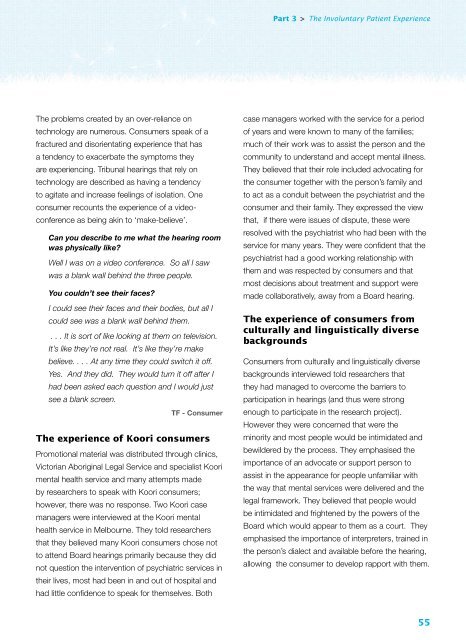Lacking Insight - Community Law
Lacking Insight - Community Law
Lacking Insight - Community Law
- No tags were found...
You also want an ePaper? Increase the reach of your titles
YUMPU automatically turns print PDFs into web optimized ePapers that Google loves.
Part 3 > The Involuntary Patient ExperienceThe problems created by an over-reliance ontechnology are numerous. Consumers speak of afractured and disorientating experience that hasa tendency to exacerbate the symptoms theyare experiencing. Tribunal hearings that rely ontechnology are described as having a tendencyto agitate and increase feelings of isolation. Oneconsumer recounts the experience of a videoconferenceas being akin to ‘make-believe’.Can you describe to me what the hearing roomwas physically like?Well I was on a video conference. So all I sawwas a blank wall behind the three people.You couldn’t see their faces?I could see their faces and their bodies, but all Icould see was a blank wall behind them.. . . It is sort of like looking at them on television.It’s like they’re not real. It’s like they’re makebelieve. . . . At any time they could switch it off.Yes. And they did. They would turn it off after Ihad been asked each question and I would justsee a blank screen.TF - ConsumerThe experience of Koori consumersPromotional material was distributed through clinics,Victorian Aboriginal Legal Service and specialist Koorimental health service and many attempts madeby researchers to speak with Koori consumers;however, there was no response. Two Koori casemanagers were interviewed at the Koori mentalhealth service in Melbourne. They told researchersthat they believed many Koori consumers chose notto attend Board hearings primarily because they didnot question the intervention of psychiatric services intheir lives, most had been in and out of hospital andhad little confidence to speak for themselves. Bothcase managers worked with the service for a periodof years and were known to many of the families;much of their work was to assist the person and thecommunity to understand and accept mental illness.They believed that their role included advocating forthe consumer together with the person’s family andto act as a conduit between the psychiatrist and theconsumer and their family. They expressed the viewthat, if there were issues of dispute, these wereresolved with the psychiatrist who had been with theservice for many years. They were confident that thepsychiatrist had a good working relationship withthem and was respected by consumers and thatmost decisions about treatment and support weremade collaboratively, away from a Board hearing.The experience of consumers fromculturally and linguistically diversebackgroundsConsumers from culturally and linguistically diversebackgrounds interviewed told researchers thatthey had managed to overcome the barriers toparticipation in hearings (and thus were strongenough to participate in the research project).However they were concerned that were theminority and most people would be intimidated andbewildered by the process. They emphasised theimportance of an advocate or support person toassist in the appearance for people unfamiliar withthe way that mental services were delivered and thelegal framework. They believed that people wouldbe intimidated and frightened by the powers of theBoard which would appear to them as a court. Theyemphasised the importance of interpreters, trained inthe person’s dialect and available before the hearing,allowing the consumer to develop rapport with them.55
















